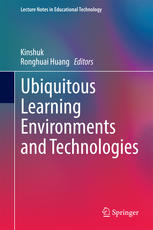

Most ebook files are in PDF format, so you can easily read them using various software such as Foxit Reader or directly on the Google Chrome browser.
Some ebook files are released by publishers in other formats such as .awz, .mobi, .epub, .fb2, etc. You may need to install specific software to read these formats on mobile/PC, such as Calibre.
Please read the tutorial at this link: https://ebookbell.com/faq
We offer FREE conversion to the popular formats you request; however, this may take some time. Therefore, right after payment, please email us, and we will try to provide the service as quickly as possible.
For some exceptional file formats or broken links (if any), please refrain from opening any disputes. Instead, email us first, and we will try to assist within a maximum of 6 hours.
EbookBell Team

0.0
0 reviewsThis book focuses on the design and architecture of ubiquitous learning environments, associated technologies, various learning scenarios supported by these environments, and different contexts that arise in environments where the seamless immersion of formal and informal activities and interactions has the potential to contribute to the learning process. With particular focus on adaptivity for individual learners, the book explores the diminishing boundaries of formal and informal learning, and the potential of location-aware context-sensitive approaches that are emerging as successors to the Web 2.0 paradigm.